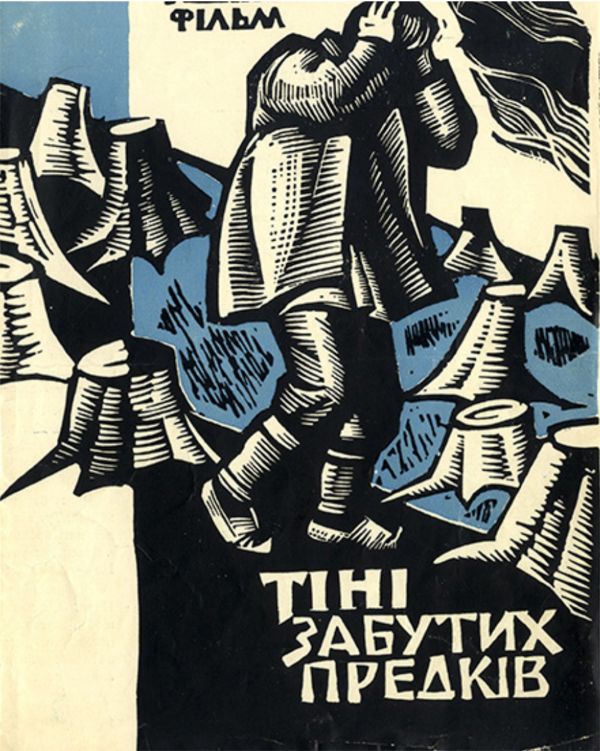
Sergei Parajanov – Visionary Ukrainian Film Director
As the war in Ukraine surges on and Russia does its best to subjugate or, if that doesn’t work, wipe out the Ukrainians and their culture, it’s worth noting that the Soviet Union did it’s best to do something similar to Sergei Parajanov in the 1960s – 1980s.
The above cover is for an extremely scarce original program of Shadows of Forgotten Ancestors (and printed in Kiev) for this Ukrainian film of visionary director Sergei Parajanov.
Vintage original 8 x 6” (21 x 15.5 cm.) program, Ukarine. 4 pp., slight creasing at edge of pictorial rappers, near fine. Ivan Mykolachuk, Larise Kadochnikova, dir: Sergei Parajanov.
Sergei Parajanov (January 9, 1924 – July 20, 1990) was a Soviet Armenian film director, screenwriter and artist who made seminal contribution to world cinema with his films Shadows of Forgotten Ancestors and The Color of Pomegranates. Parajanov is regarded by film critics, film historians, and filmmakers to be one of the greatest and most influential filmmakers in cinema history.
A Beginning
After studying film and music, Parajanov became an assistant director at the Dovzhenko studios in Kiev, making his directorial debut in 1954, following that with numerous shorts and features, all of which he subsequently dismissed as ‘garbage’.
His Own Cinematic Style
In 1964 he made Shadows of Forgotten Ancestors (renamed Wild Horses of Fire for most foreign distribution) a rhapsodic celebration of Ukrainian folk culture. Suddenly, the world discovered a startling and idiosyncratic new talent and he became something of an international celebrity and simultaneously a target of attacks from the USSR.
He followed this up with the even more innovative The Color of Pomegranates, (1969) (which explored the art and poetry of his native Armenia in a series of stunningly beautiful tableaux).
He had invented his own cinematic style, which was out of step with the guiding principles of socialist realism; the only sanctioned art style in the USSR. This, combined with his lifestyle and behavior, led Soviet authorities to repeatedly persecute and imprison him, and suppress his films. Despite this, Parajanov was named one of the 20 Film Directors of the Future by the Rotterdam International Film Festival, and his films were ranked among the greatest films of all time by the British Film Institute‘s magazine Sight & Sound.
Banned by the USSR
Nearly all of his film projects and plans from 1965 to 1973 were banned, scrapped or closed by the Soviet film administrations, both locally (in Kyiv and Yerevan) and federallly (Goskino), until he was finally arrested in late 1973 on false charges of rape, homosexuality and bribery.
Persona Non Grata
He was imprisoned until 1977, despite pleas for pardon from various artists. Even after his release (he was arrested for the third and last time in 1982) he was a persona non grata in Soviet cinema. It was not until the mid-1980s, when the political climate started to relax, that he could resume directing. Still, it required the help of influential Georgian actor Dodo Abashidze and other friends to have his last feature films greenlighted.
Death
His health seriously weakened after four years in labor camps and nine months in prison in Tbilisi. Parajanov died of lung cancer in 1990, at a time when, after almost 20 years of suppression, his films were being featured at foreign film festivals. In a 1988 interview he stated that, “Everyone knows that I have three Motherlands. I was born in Georgia, worked in Ukraine and I’m going to die in Armenia.” Parajanov is buried at Komitas Pantheon in Yerevan.
Resurrection
Parajanov’s films won prizes at Mar del Plata Film Festival, Istanbul International Film Festival, Nika Awards, Rotterdam International Film Festival, Sitges – Catalan International Film Festival, São Paulo International Film Festival and others. A comprehensive retrospective in the UK took place in 2010 at BFI Southbank. The retrospective was curated by Layla Alexander-Garrett and Parajanov specialist Elisabetta Fabrizi who commissioned a Parajanov-inspired new commission in the BFI Gallery by contemporary artist Matt Collishaw (‘Retrospectre’). A symposium was dedicated to Paradjanov’s work bringing together experts to discuss and celebrate the director’s contribution to cinema and art.
- African American Movie Memorabilia
- African Americana
- Black History
- Celebrating Women’s HistoryI Film
- Celebrity Photographs
- Current Exhibit
- Famous Female Vocalists
- Famous Hollywood Portrait Photographers
- Featured
- Film & Movie Star Photographs
- Film Noir
- Film Scripts
- Hollywood History
- Jazz Singers & Musicians
- LGBTQ Cultural History
- LGBTQ Theater History
- Lobby Cards
- Movie Memorabilia
- Movie Posters
- New York Book Fair
- Pressbooks
- Scene Stills
- Star Power
- Vintage Original Horror Film Photographs
- Vintage Original Movie Scripts & Books
- Vintage Original Publicity Photographs
- Vintage Original Studio Photographs
- WalterFilm
